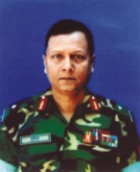|
Musings
Tales of Three Dead Men
Syed Badrul Ahsan
No one expected Syed Khwaja Moinul Hassan to die so young and so soon. He was only in his mid-fifties, which for many of us is but the beginning of life in all its aesthetic celebrations. But Hassan is dead. Because the inevitability of dying is a force no rampart can hold back, we say farewell to him. He is gone, like all glory that passes. Life, like dreams, is fleeting. Expand the term. Life is that fleeting phase of experience which must sooner or later succumb to the finality of death.
There is something in the mind that tells us that the end of life must be met with fortitude. But then the heart comes in, with the old message that remembered realities and fading dreams do not let the sea of emotions in us die. In these past few weeks, images of death have been all. Shakil Ahmed was killed in a brutal manner. His murderers shot him, then bayoneted him and then appeared to want to burn him to ashes. His eyes were open when the last breath escaped his body. You watch that horrifying image on the internet and ask, in deep sadness: Is this the friend I shared conversations and coffee with? You try brushing away that horror-drenched image from your mind. You remember the way he smiled, the gentleness of his conversation. Deep in the night, though, that image of tragedy drifts back into the dark regions of your mind. You think of your friend in the grave, suddenly shaken into the realisation that you will never again have a conversation with him.
 |
 |
 |
| Syed Khwaja Moinul Hassan |
Maj Gen Shakil Ahmed |
Maj Gen Rafiqul Islam |
It was only days after Shakil Ahmed's gruesome end that Rafiqul Islam called. As a colleague of the slain general, as a general himself, Rafiq was general officer commanding in Jessore. He was sad, made infinitely morose by the way fate had dealt with Shakil. And then, in a freak accident where the helicopter carrying him got entangled in electricity wires before hitting a tree and plunging into a rural pond, Rafiq died. He was a handsome man, with greenish eyes. He was tall, and his walk revealed the dignity in him. Rafiqul Islam was every inch a soldier, whether he was commanding troops at home, working at the Bangladesh High Commission in London or keeping the peace in a strife-riven country in Africa. There were moments when righteous anger came over him, and that was when he saw wrong being committed when right should have been in focus. Like Shakil Ahmed, he abjured elitism. He radiated confidence in people around him, through cracking jokes or breaking into laughter. When it came to food, Rafiqul Islam made his preferences known: plain rice was what he relished. No pulao, no fancy food for him. He loved his wife and his children with a passion, making sure that they had their regular holidays and learning a little more about the ways of the world.
And now Rafiq is gone. The world keeps getting increasingly poorer with all the departures that happen before you. Syed Khwaja Moinul Hassan's passing leaves a gaping hole in your world of literary sensibilities. There was forever the poet in him, a gigantic wish to be transported to the shores that once reverberated with the lyricism of Shelley and Byron and Keats. Think of the Wild West Wind that Shelley celebrated once and you will have a fairly credible idea of what it was to be Khwaja. His poetry was a series of conviction outbursts, a demand to be heard in a world that had begun to love listening to its own capricious voice. In his vibrant rendition of the poetic spirit, Khwaja reminded you of the glorious traditions of the subcontinent that men of shallow thought so crudely left divided, burning and heartbroken in a blazing August years ago. He came of the Nawab clan and yet he was careful to shed the conservatism that had characterised it for the better part of generations.
Syed Khwaja Moinul Hassan admired the brave and the striving. His respect for Sheikh Hasina was as deep and abiding as it was for Benazir Bhutto. Both women, he thought, were fighters, individuals who kept hope alive in the troubled souls of their nations. In distant South Carolina, he knew his heart was always where it wanted to be --- home here in Bangladesh. And so it was that when he came back to Dhaka, as part of a programme arranged by a local university, he went travelling back into the old streets and joints of his past. You had that sure sense that given a choice, he would not go back to his adopted country. But then, life is short on choices and long on compulsions. He kept going back to Claflin College. His living soul hovered somewhere over the mountains and the high seas.
The stories of the dead are never-ending. These men come to you in your dreams, in mist that does not explain itself. Do they come to tell you that you too have arrived at twilight, that the night comes fast --- to bury your daylight in its core for all times?
Copyright
(R) thedailystar.net 2009 |
